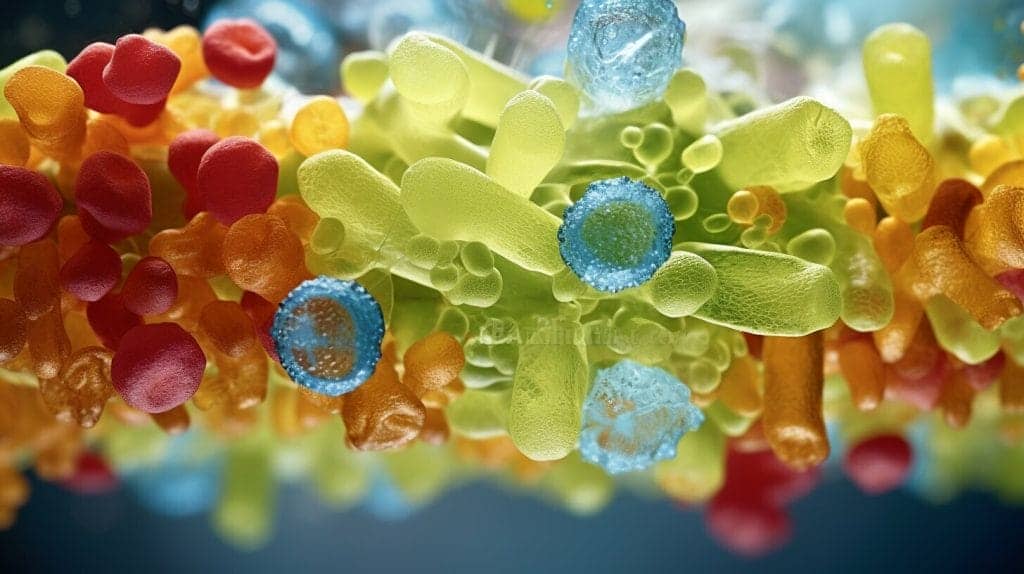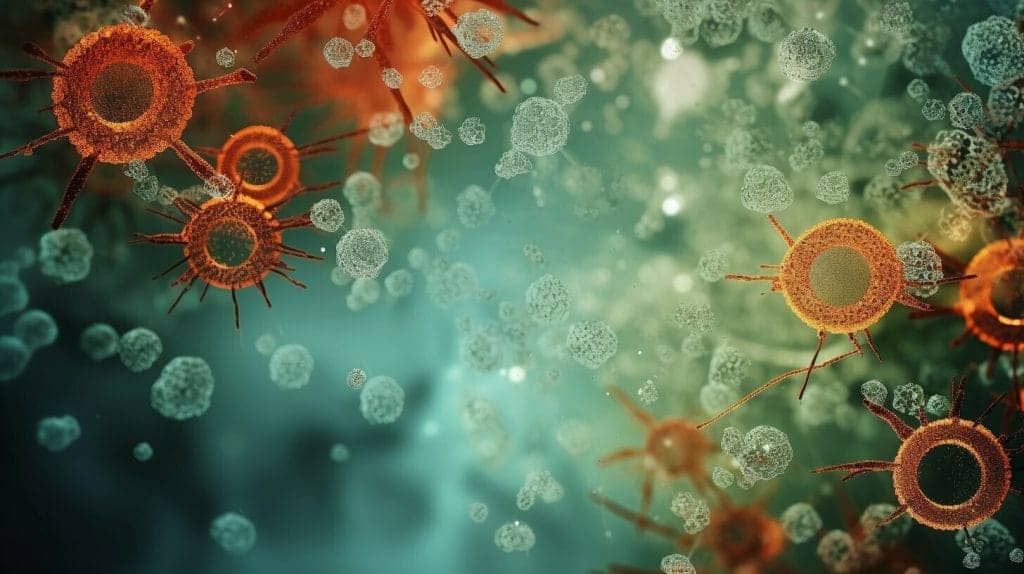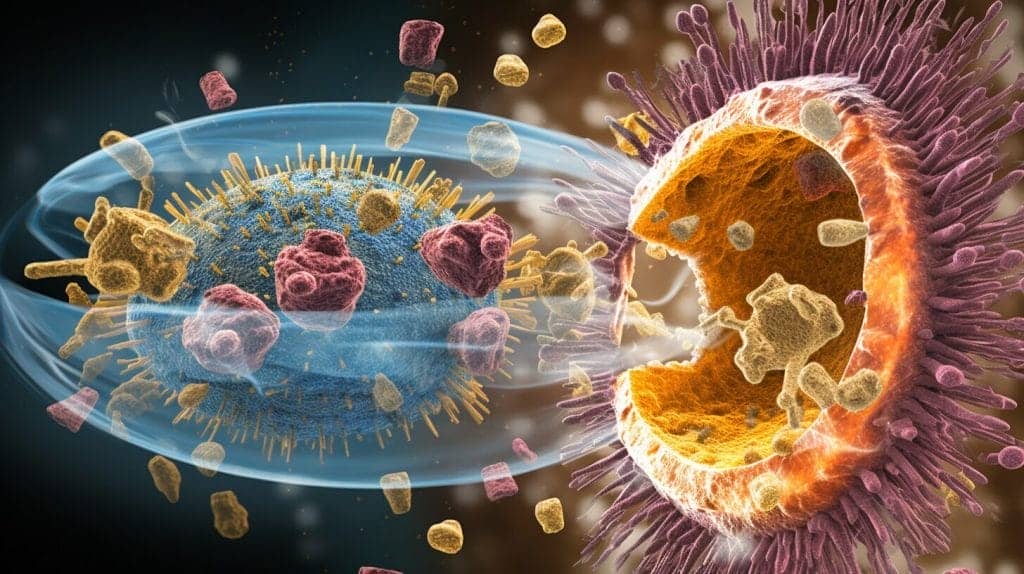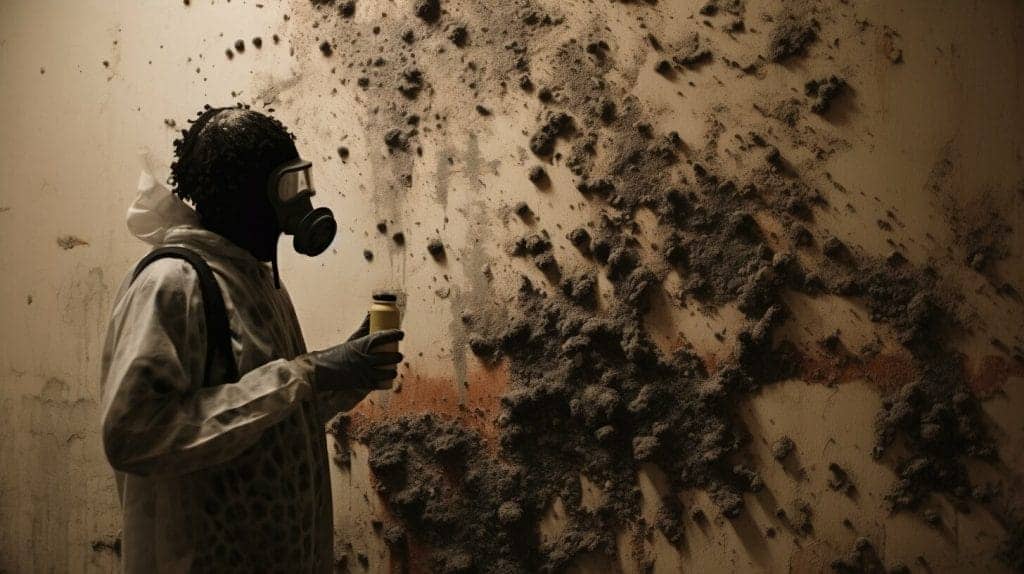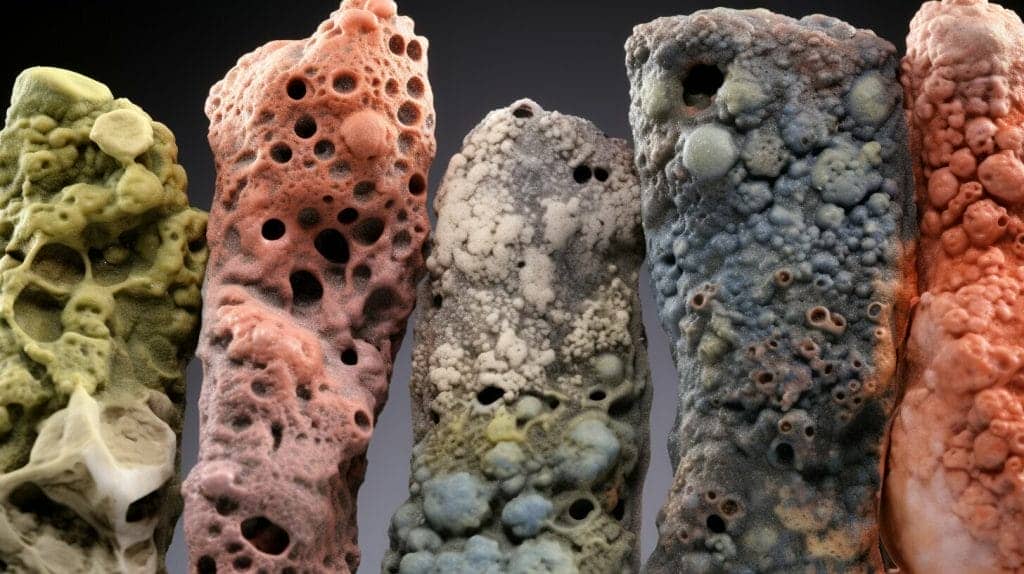Mycotoxins are fungal toxins that can contaminate food, crops, and indoor environments. Exposure to mycotoxins has been linked to a range of health problems, from respiratory issues to cancer. Understanding the molecular pathways involved in mycotoxin metabolism, detoxification, and effects is crucial in assessing health risks and developing effective treatment strategies.
Key Takeaways:
- Mycotoxins are fungal toxins that can contaminate food, crops, and indoor environments.
- Exposure to mycotoxins has been linked to a range of health problems, from respiratory issues to cancer.
- Understanding mycotoxin molecular pathways is crucial for assessing health risks and developing effective treatment strategies.
Exploring Mycotoxin Metabolism and Detoxification
Mycotoxins are metabolized and detoxified through several pathways in the body. These pathways involve enzymes and cellular processes that help to break down mycotoxins into less harmful compounds, which can then be eliminated through the urine or feces. Understanding these pathways is crucial for developing effective detoxification strategies to mitigate the potentially harmful effects of mycotoxin exposure.
| Mycotoxin Metabolism | Mycotoxin Detoxification |
|---|---|
| • Mycotoxins can be metabolized through oxidation, reduction, and hydrolysis reactions. | • Detoxification of mycotoxins can involve conjugation with glutathione, glucuronic acid, or sulfate groups. |
| • Enzymes such as cytochrome P450 and flavin-containing monooxygenases play a crucial role in mycotoxin metabolism. | • Enzymes such as glutathione-S-transferases and sulfotransferases are involved in mycotoxin detoxification. |
| • Some mycotoxins are excreted unchanged in the urine or feces. | • The resulting detoxified compounds can be eliminated through the urine or feces. |
Research shows that individual variation in mycotoxin metabolism and detoxification can affect an individual’s susceptibility to mycotoxin-related diseases. Differences in the activity of these enzymes and pathways can lead to differences in the toxic effects of mycotoxin exposure. Understanding these pathways can aid in developing personalized detoxification strategies based on an individual’s genetics and physiology.
The role of the gut microbiome in mycotoxin metabolism and detoxification is also an area of active research. Some studies suggest that gut bacteria can help to detoxify mycotoxins and mitigate their harmful effects.
The Effects of Mycotoxins on Human Health
Mycotoxins are toxic compounds produced by certain types of fungi commonly found in food, feed, and other crops. These fungi can grow on a variety of substrates, producing a range of mycotoxins that can have harmful effects on human health.
Exposure to mycotoxins can occur through ingestion, inhalation, or skin contact, depending on the type of mycotoxin and the source of contamination. The effects of mycotoxins on human health can vary depending on factors such as the dose, duration of exposure, and individual susceptibility.
Studies have shown that mycotoxins can have a range of toxic effects on the body, including carcinogenic, immunotoxic, nephrotoxic, neurotoxic, and hepatotoxic effects. Some mycotoxins have also been associated with specific diseases, such as aflatoxin and liver cancer.
The toxic effects of mycotoxins can be particularly severe in vulnerable populations such as children, pregnant women, and individuals with compromised immune systems. It is important to understand the molecular pathways involved in mycotoxin toxicity to develop effective prevention and treatment strategies.
Recognizing the potential health implications of mycotoxin exposure, there are ongoing efforts to improve risk assessment and develop guidelines for mycotoxin contamination control. These efforts are critical in protecting public health and minimizing the risk of mycotoxin-related diseases.
Current Research on Mycotoxin Molecular Pathways
Research on mycotoxin molecular pathways has gained significant momentum in recent years, with scientists exploring various aspects of the topic. Some of the key areas of research include the identification and characterization of mycotoxin metabolic pathways, the development of sensitive and accurate analytical methods for mycotoxin detection, and the investigation of mycotoxin-related diseases and their underlying mechanisms.
One of the major goals of mycotoxin research is to gain a comprehensive understanding of the molecular pathways involved in mycotoxin metabolism and detoxification. This will help in the development of effective methods for mycotoxin detection, prevention, and treatment. Researchers are also studying the environmental factors that influence mycotoxin production, as well as the factors that affect mycotoxin toxicity and health outcomes.
Advancements in analytical techniques have also led to the development of more sensitive and accurate methods for mycotoxin detection. These include techniques such as liquid chromatography-mass spectrometry (LC-MS), which can detect mycotoxins at very low concentrations. Such methods are essential for identifying potential sources of mycotoxin contamination and for monitoring levels of exposure.
Overall, the results of current mycotoxin research are promising and have the potential to improve our understanding of the health risks associated with mycotoxin exposure. Continued research in this field will help in the development of effective strategies for mycotoxin risk assessment, prevention, and treatment.
Implications for Risk Assessment and Contamination Control
Understanding the molecular pathways of mycotoxins has important implications for both risk assessment and contamination control. The health implications associated with mycotoxin exposure highlight the need for effective risk assessment strategies. Accurate risk assessment models and guidelines can help identify potential sources of contamination and prevent exposure.
Mycotoxin-related diseases can be severe and difficult to diagnose, further emphasizing the importance of risk assessment. With accurate risk assessment, public health officials can take proactive measures to prevent and reduce the impact of mycotoxin exposure.
Contamination control is also critical to mitigating health risks from mycotoxin exposure. Understanding mycotoxin molecular pathways can help identify effective ways to detoxify and eliminate mycotoxins. It can also inform the development of new technologies and strategies to prevent contamination in the first place.
Overall, a deep understanding of mycotoxin molecular pathways is crucial for effective risk assessment and contamination control. It is only through this understanding that we can take proactive measures to protect public health.
Holistic Treatment Approaches at Oasis Medical Institute
For those seeking comprehensive, patient-centered care for mycotoxin-related health concerns, Oasis Medical Institute in Tijuana, MX offers a holistic Mold Toxicity treatment program. Led by Dr. Francisco Contreras MD, a pioneer in Integrative Oncology and the Medical Director at Oasis of Hope Hospital, the program combines traditional medical practices with a range of therapeutic modalities to address the underlying molecular pathways and improve overall well-being.
At Oasis Medical Institute, patients have access to a variety of holistic treatments, including nutrient supplementation, immune system support, detoxification techniques, and lifestyle interventions. The program emphasizes the integration of mind, body, and spirit to promote healing and improve quality of life.
Dr. Contreras and his team of medical professionals take a personalized approach to each patient’s care, tailoring treatment plans to their individual needs. This attention to detail has resulted in significant success stories and patient testimonials.
Understanding the Role of Holistic Medicine for Mold Toxicity
At Oasis Medical Institute, the focus is on providing comprehensive care for patients dealing with Mold Toxicity. Dr. Francisco Contreras MD, the medical director, takes an integrative approach to treatment, combining traditional and holistic therapies to address the root causes of mycotoxin-related health issues.
Patients at Oasis Medical Institute benefit from a personalized treatment program that considers their unique needs and preferences. The goal is not only to address their symptoms but also to improve their overall well-being.
The Integrated Approach to Mycotoxin Treatment
The integrated approach involves combining various therapeutic modalities to address the underlying molecular pathways that contribute to mycotoxin-related health issues. The treatment program at Oasis Medical Institute may include detoxification therapies, immune system support, nutritional counseling, and stress management techniques.
In addition to these therapies, patients may also benefit from complementary treatments such as acupuncture, massage, and yoga. These holistic treatments can help to enhance overall wellness and improve the body’s ability to heal and recover.
Comprehensive Care for Mold Toxicity at Oasis Medical Institute
Patients at Oasis Medical Institute have access to a wide range of therapies and treatments to address their mycotoxin-related health concerns. The comprehensive care program may include:
| Therapies | Treatments |
|---|---|
| Detoxification Therapies | Colon Hydrotherapy, Intravenous Nutrient Therapy, Lymphatic Drainage Therapy, Far-Infrared Sauna Therapy |
| Immune System Support | Biologic Response Modifiers, Anti-Microbial Agents, Hyperthermia Therapy, Immunomodulators |
| Nutritional Counseling | Customized Diet Plans, Supplementation, Food Allergy Testing, Digestive System Evaluation and Support |
| Stress Management Techniques | Mind-Body Techniques, Neurofeedback, Counseling, Energy Medicine |
The treatment program is designed to address both the physical and emotional components of mycotoxin-related health issues. Patients are encouraged to actively participate in their care and take steps to improve their overall health and well-being.
Booking a Consultation for Holistic Mold Toxicity Treatment
To book a consultation for the holistic Mold Toxicity treatment program at Oasis Medical Institute, patients can call 866-868-1992. The team will provide information on the treatment options available and schedule an appointment with Dr. Francisco Contreras MD.
The personalized approach at Oasis Medical Institute, combined with the integrative treatment program, has been highly effective in addressing mycotoxin-related health issues. Patients can expect comprehensive care that considers their unique needs, preferences, and overall well-being.
Booking a Consultation for Holistic Mold Toxicity Treatment
If you’re interested in exploring the benefits of the holistic Mold Toxicity treatment program at Oasis Medical Institute, booking a consultation is the first step. To schedule an appointment with Dr. Francisco Contreras MD, call 866-868-1992.
During the consultation, Dr. Contreras will take the time to understand your specific health concerns and discuss how the integrative approach can help you achieve optimal well-being. With personalized care and attention, the comprehensive treatment program addresses both the underlying molecular pathways and your overall health.
Don’t let mycotoxin-related health issues compromise your well-being. Take control of your health by booking a consultation for the holistic Mold Toxicity treatment program at Oasis Medical Institute today.
The Integrated Approach to Mycotoxin Treatment
At Oasis Medical Institute, the treatment approach for Mold Toxicity is holistic and integrative. This means that Dr. Francisco Contreras MD and his team of experts combine various treatment modalities to address the underlying molecular pathways of the mycotoxin-related health issues, as well as the patient’s overall well-being.
The integrative approach includes a range of therapies and treatments such as intravenous nutrient therapy, detoxification protocols, personalized nutrition plans, and stress-management techniques. By addressing the patient’s individual needs and circumstances, the treatment program can effectively restore the body’s natural healing mechanisms and promote recovery.
Dr. Contreras and his team strive to provide comprehensive care that goes beyond mere symptom relief. The holistic approach emphasizes the importance of treating the root cause of the illness, rather than just masking the symptoms. With this approach, patients can achieve long-term health benefits and prevent future mycotoxin exposure.
Comprehensive Care for Mold Toxicity at Oasis Medical Institute
Oasis Medical Institute in Tijuana, Mexico, offers a comprehensive care program for Mold Toxicity, which combines traditional and holistic treatments to address mycotoxin-related health issues. Dr. Francisco Contreras MD and his team of experts provide personalized treatment plans to help patients regain their health and well-being.
| Treatments Offered | Description |
|---|---|
| Detoxification Therapies | These therapies help eliminate mycotoxins from the body, improving the patient’s overall health and reducing the risk of future exposure. |
| Nutritional Support | A customized nutrition plan can help restore the body’s natural balance and support the immune system, helping fight off the toxic effects of mycotoxin exposure. |
| Immune System Boosters | Supplements and therapies can be used to boost the immune system, helping the body fight off infections and diseases related to mycotoxin exposure. |
| Mind-Body Therapies | Patient-centered relaxation techniques such as yoga, meditation and other therapies, can help patients reduce stress, improve sleep, and manage symptoms related to Mold Toxicity. |
The holistic Mold Toxicity treatment program at Oasis Medical Institute provides patients with a comprehensive approach to addressing mycotoxin-related health issues. The program is customizable to each patient’s unique needs, ensuring that they receive optimized care.
Advancements in Mycotoxin Research and Treatment
The field of mycotoxin research and treatment is constantly evolving, with new advancements being made all the time. There is a growing interest in holistic treatments that take into account the whole person rather than simply treating symptoms.
One area of mycotoxin research that has seen recent advancements is the development of new detoxification strategies. Researchers are exploring the use of natural substances like activated charcoal and bentonite clay to bind with mycotoxins and prevent them from being absorbed by the body.
Another area of interest is the use of immune-boosting therapies to strengthen the body’s own defenses against mycotoxin exposure. This includes the use of specific vitamins and minerals, as well as intravenous therapies like ozone and hydrogen peroxide.
The Integration of Holistic Treatments
As researchers continue to make progress in understanding mycotoxin molecules, treatment approaches are becoming increasingly integrated. Medical professionals are combining traditional Western medicine with holistic treatments like acupuncture, chiropractic care, and herbal remedies to provide patients with a more comprehensive approach to healing.
Holistic treatments often focus on addressing the underlying causes of mycotoxin-related health issues, rather than simply treating symptoms. This can involve lifestyle changes like diet and exercise, as well as stress management techniques like meditation and yoga. By treating the whole person, rather than just the disease, holistic treatments aim to promote overall health and wellbeing.
Emerging Therapies
As more research is conducted into the effects of mycotoxins on the body, new therapies are emerging that show promise in treating mycotoxin-related health issues. One such therapy is the use of intravenous vitamin C, which has been shown to have a powerful antioxidant effect in the body and can enhance the immune system’s ability to fight off toxins.
Another emerging therapy is the use of low-level laser therapy, which has been shown to increase cellular energy production and promote healing at the cellular level. This therapy has shown promise in treating a range of mycotoxin-related health issues, including chronic fatigue syndrome, fibromyalgia, and autoimmune disorders.
As research into mycotoxin molecular pathways continues to advance, it is likely that new therapies will emerge that can provide patients with even greater healing potential.
Promoting Awareness and Prevention of Mycotoxin Exposure
Mycotoxins are toxic substances produced by certain molds and can be found in crops, grains, and other food sources. Exposure to mycotoxins can pose health risks, including respiratory and gastrointestinal problems, as well as potentially severe long-term effects on the liver and immune system.
Preventing mycotoxin exposure starts with identifying potential sources of contamination. This can include inspecting food for visible mold or discoloration, ensuring proper storage and ventilation of crops and grains, and promptly addressing any water damage or moisture issues in homes or workplaces.
Individuals can also take proactive measures to minimize exposure, such as using masks and gloves when handling potentially contaminated materials and seeking out certified mycotoxin-free products whenever possible.
It is crucial to promote awareness about mycotoxin exposure and its potential health effects. By taking a proactive and informed approach, individuals can play a role in safeguarding their health and preventing future contamination.
Conclusion
Understanding mycotoxin molecular pathways is crucial for effective prevention, research, and treatment of mycotoxin-related diseases. The metabolism and detoxification pathways of mycotoxins play a vital role in determining their potential toxic effects. Research in this field is ongoing, and recent advancements have brought about new treatment approaches, including an integrative approach that combines traditional medicine and holistic treatments.
Healthy Living Tips
Promoting awareness and prevention of mycotoxin exposure is also essential. Individuals should be proactive in identifying and addressing potential sources of contamination to safeguard their health. Regular check-ups and consultations with medical experts can help detect and manage any mycotoxin-related health concerns.
Effective Treatment Options
For those who have already been exposed to mycotoxins, a comprehensive treatment program is necessary. The holistic Mold Toxicity treatment program offered by Oasis Medical Institute in Tijuana, MX, is an excellent resource for individuals seeking effective and comprehensive care. Dr. Francisco Contreras, MD, and his team provide an integrated approach that focuses on both molecular pathways and the patient’s overall well-being.
Overall, understanding mycotoxin molecular pathways is crucial for developing effective prevention and treatment strategies. With advancements in research and the availability of comprehensive treatment programs like those offered at Oasis Medical Institute, individuals can better manage and mitigate the potential health risks associated with mycotoxin exposure.
FAQ
Q: What are mycotoxin molecular pathways?
A: Mycotoxin molecular pathways refer to the biochemical processes and mechanisms by which mycotoxins are metabolized, detoxified, and their effects on the body. Understanding these pathways is crucial in assessing health risks and developing effective prevention and treatment strategies.
Q: How are mycotoxins metabolized and detoxified in the body?
A: Mycotoxins are metabolized and detoxified through various enzymatic pathways and cellular processes. The liver plays a crucial role in these mechanisms by breaking down mycotoxins into less toxic compounds that can be eliminated from the body.
Q: What are the potential health effects of mycotoxin exposure?
A: Mycotoxin exposure can lead to a range of health issues, including respiratory problems, allergic reactions, immune system suppression, neurological disorders, and even cancer. Understanding the molecular pathways helps in identifying and mitigating these health risks.
Q: What is the current research focused on in mycotoxin molecular pathways?
A: Current research on mycotoxin molecular pathways aims to further understand the mechanisms of mycotoxin toxicity and potential therapeutic interventions. Researchers are investigating new detoxification strategies and identifying biomarkers to assess exposure levels.
Q: How can understanding mycotoxin molecular pathways help in risk assessment and contamination control?
A: Understanding mycotoxin molecular pathways is crucial in accurately assessing health risks associated with mycotoxin exposure and developing effective contamination control strategies. It enables the development of accurate risk assessment models and guidelines to ensure public safety.
Q: What holistic treatments are available at Oasis Medical Institute for Mold Toxicity?
A: Oasis Medical Institute in Tijuana, MX offers holistic treatment options for Mold Toxicity. Their integrative approach combines conventional medicine with complementary therapies, providing comprehensive care to address mycotoxin-related health concerns.
Q: How does holistic medicine help in treating Mold Toxicity?
A: Holistic medicine plays a crucial role in treating Mold Toxicity by addressing the underlying molecular pathways and considering the patient’s overall well-being. It incorporates various treatment modalities to optimize health and promote healing.
Q: How can I book a consultation for the holistic Mold Toxicity treatment program?
A: To book a consultation for the holistic Mold Toxicity treatment program at Oasis Medical Institute, please contact us at 866-868-1992. Dr. Francisco Contreras MD offers personalized and comprehensive care for individuals seeking treatment for mycotoxin-related health concerns.
Q: What is the integrated approach to mycotoxin treatment?
A: The integrated approach to mycotoxin treatment combines various treatment modalities, including conventional medicine, complementary therapies, and lifestyle modifications. This approach aims to address both the molecular pathways involved and the patient’s overall well-being.
Q: What comprehensive care does Oasis Medical Institute provide for Mold Toxicity?
A: Oasis Medical Institute offers comprehensive care for Mold Toxicity, including a wide range of therapies and treatments. Their holistic Mold Toxicity treatment program is designed to address mycotoxin-related health concerns through a personalized and integrated approach.
Q: Are there any recent advancements in mycotoxin research and treatment?
A: Yes, there have been recent advancements in mycotoxin research and treatment approaches. Researchers are continuously exploring new therapies and integrating holistic treatments into traditional medical practices to improve outcomes for individuals affected by mycotoxin exposure.
Q: How can we promote awareness and prevention of mycotoxin exposure?
A: Promoting awareness and prevention of mycotoxin exposure is crucial to safeguarding health. It is essential to educate individuals on identifying and addressing potential sources of contamination, implementing proactive measures, and seeking professional help if needed.
Dr. Francisco Contreras, MD is a renowned integrative medical physician with over 20 years of dedicated experience in the field of integrative medicine. As the Medical Director of the Oasis of Hope Hospital in Tijuana, Mexico, he has pioneered innovative treatments and integrative approaches that have been recognized globally for the treatment of cancer, Lyme Disease, Mold Toxicity, and chronic disease using alternative treatment modalities. Dr. Contreras holds a medical degree from the Autonomous University of Mexico in Toluca, and speciality in surgical oncology from the University of Vienna in Austria.
Under his visionary leadership, the Oasis of Hope Hospital has emerged as a leading institution, renowned for its innovative treatments and patient-centric approach for treating cancer, Lyme Disease, Mold Toxicity, Long-Haul COVID, and chronic disease. The hospital, under Dr. Contreras's guidance, has successfully treated thousands of patients, many of whom traveled from different parts of the world, seeking the unique and compassionate care the institution offers.
Dr. Contreras has contributed to numerous research papers, articles, and medical journals, solidifying his expertise in the realm of integrative medicine. His commitment to patient care and evidence-based treatments has earned him a reputation for trustworthiness and excellence. Dr. Contreras is frequently invited to speak at international conferences and has been featured on CNN, WMAR2 News, KGUN9 News, Tyent USA, and various others for his groundbreaking work. His dedication to the medical community and his patients is unwavering, making him a leading authority in the field.
Contreras has authored and co-authored several books concerning integrative therapy, cancer, Lyme Disease and heart disease prevention and chronic illness, including "The Art Science of Undermining Cancer", "The Art & Science of Undermining Cancer: Strategies to Slow, Control, Reverse", "Look Younger, Live Longer: 10 Steps to Reverse Aging and Live a Vibrant Life", "The Coming Cancer Cure Your Guide to effective alternative, conventional and integrative therapies", "Hope Medicine & Healing", "Health in the 21st Century: Will Doctors Survive?", "Healthy Heart: An alternative guide to a healthy heart", “The Hope of Living Cancer Free”, “Hope Of Living Long And Well: 10 Steps to look younger, feel better, live longer” “Fighting Cancer 20 Different Ways”, "50 Critical Cancer Answers: Your Personal Battle Plan for Beating Cancer", "To Beat . . . Or Not to Beat?", and “Dismantling Cancer.”



